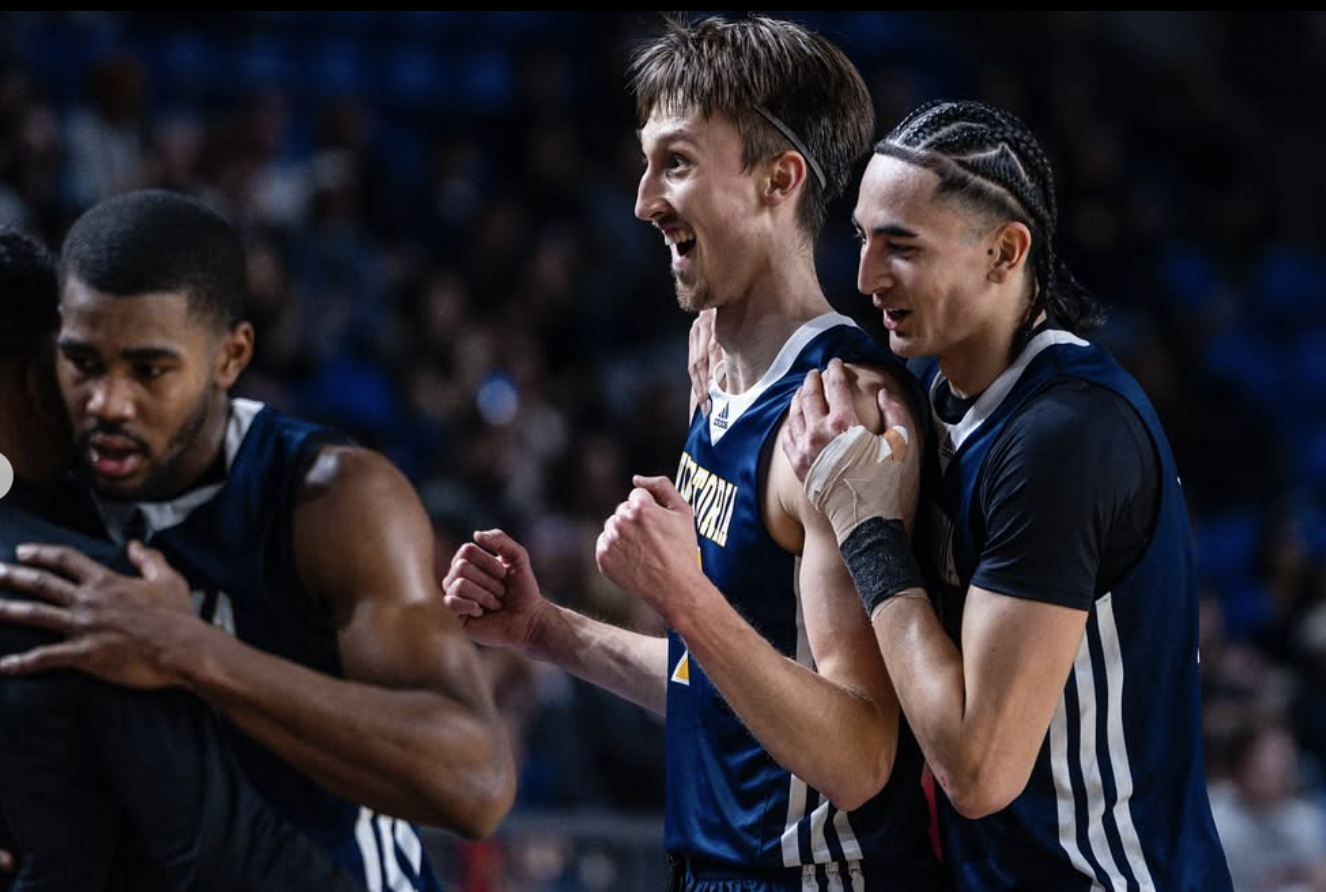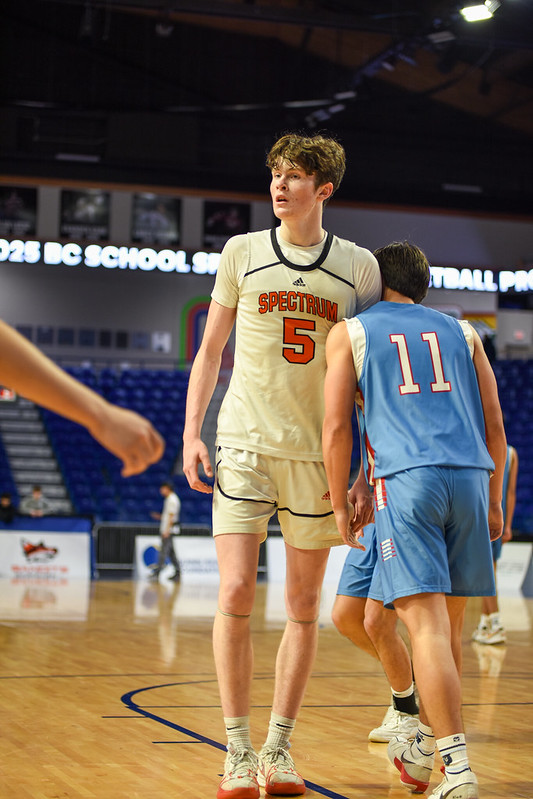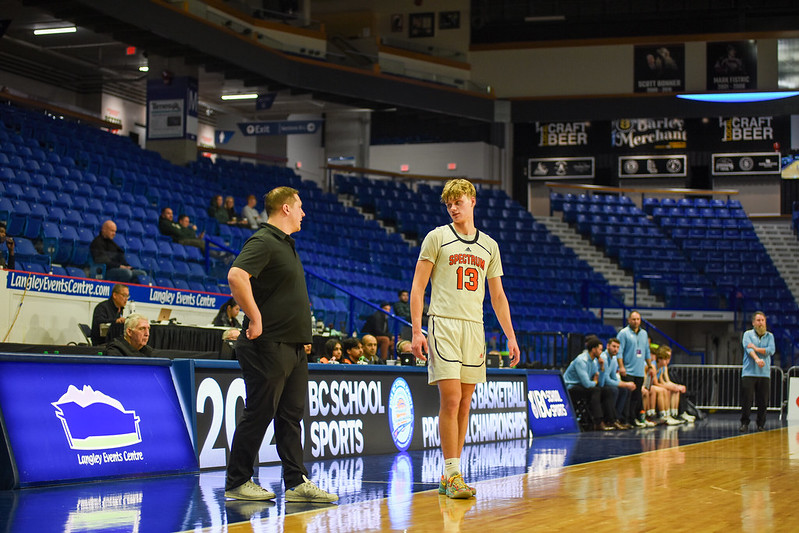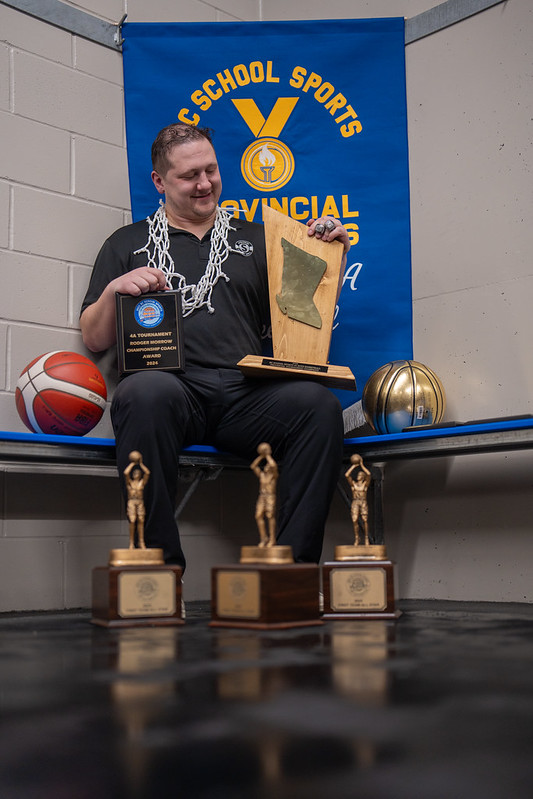How youth clubs and the Vikes created a Vancouver Island basketball revolution

Photo courtesy of the University of Victoria.
Vikes fourth year forward Ethan Boag was cut from his Royal Oak Middle School basketball team in Grade 6. That summer, Boag’s older brother encouraged him to attend the Vikes Nation youth basketball program at UVic.
When Boag returned to middle school the following year, he noticed a significant difference: “I came back, and I was like, ‘Oh wow, I actually got better.’”
Not only did he make the Grade 7 team, he was the best player they had.
Nine years later, Boag subbed off the floor of the 2025 U Sports men’s basketball championships final on March 16. There were just over three minutes remaining on the clock.
Before the game had even ended, “I almost started crying,” recalled Boag.
Victory was all but sealed. UVic had not won the Canadian men’s national basketball title in 28 years, and the Vikes team — up 36 points on the University of Calgary — were moments away from ending the drought. When the buzzer went off, Boag could only describe the feeling as surreal.
Boag’s first year playing basketball at UVic was 2021-22. The Vikes were mired in a long stretch of floundering seasons. And the once-iconic Canadian university program — which includes seven national titles in a row under UVic Sports Hall of Fame coach Ken Shields — had only made the national tournament three times over the last past 13 seasons.
But Boag and the team were optimistic. In 2019, the season before COVID-19, the Vikes enjoyed their first winning record since 2014-15. They narrowly missed nationals. And a freshman out of Oak Bay High School by the name of Diego Maffia was named to the Canada West All-Rookie Team.
Moving forward, the goal was clear: win a national championship.
“Watching UVic when I was younger, they’re not that good. Then I get here, and we start playing well and the goal is the national championship…. It was like, great, that’s my purpose in life right now,” recalled Boag.
Over the next three years, the team lost only seven combined regular season games and qualified for nationals each year. That momentum led to a 20-0 record this year, and, finally, playing in a long sought-after national title game. A game they won emphatically — tying a championship bow on one of the Vikes men’s basketball team’s most successful seasons ever.
Like many seasons, the Vikes’ championship roster this year relied heavily on home grown talent, rostering six Vancouver Island-trained players. And if Oak Bay High School alum and 2023-24 U Sports Canadian men’s basketball player of the year Diego Maffia wasn’t injured for nationals and sitting on the sideline, the Vikes starting five players may have included an astounding four Islanders.
But several signs point to the Vikes’ recent success as being just the beginning of a basketball revolution on Vancouver Island that’s been building for much longer.
Spectrum Joins B.C. Basketball History

Photo courtesy of Tyler Verde.
Last season, Spectrum Community School came out of the woodwork and became the first Vancouver Island high school to win the B.C. boys’ top-tier (now labeled Quad-A) provincials since 2007.
And if that wasn’t enough to cement the Island as a powerhouse region in provincial boys’ basketball, this season three Island high schools — Spectrum, Oak Bay, and Nanaimo’s Dover Bay — ranked one through three in the province’s high school rankings.
In March, Spectrum went on to win back-to-back provincial championships, defeating Dover Bay in an all-Island final. No Island high school has repeated as provincial champs in boys’ basketball since Oak Bay in 1973 and 1974.
Seniors Justin Hinrichsen and Tyler Felt were the one-two punch propelling Spectrum’s historic run. In 2024, Felt was named tournament MVP at provincials, while both Felt and Hinrichsen were named first team all-stars of the 2025 tournament. The two talented high-schoolers, along with Oak Bay High School’s Toren Franklin, signed with the Vikes in December 2024, and are slated to join the team in the fall.
But why this surge in Vancouver Island basketball now? Where has all this recent success come from?
Through a wide lens, that question could be answered through the recent national growth of the game. Since the Toronto Raptors won the NBA championship in 2019, Canadian interest in basketball has surged. A report from Canada Basketball showed a 33 per cent increase in youth enrollment following the Raptors’ title, and according to Sport for Life, a Canadian non-profit sport organization, basketball is now “neck-and-neck” with soccer as the country’s most played youth sport.
But for Vikes’ men’s basketball assistant coach Josh Reddy, who moved to Victoria from India when he was five years old, the Island’s current basketball culture — which he described as a “hot bed” of talent — is beginning to make a name for itself, when years earlier, “it was looked over.”
A product, Reddy claimed, of increased resources and more coaching available to youth.
Club Teams Take Off Across the Island

Photo courtesy of Tyler Verde.
During the off season, Reddy coaches the U17 Vikes Nation Youth team. But basketball development options for youth on the Island — outside of playing for a school team — have come a long way. Boag remembers Vikes Nation as being one of the only club programs available to him growing up.
“Now there’s multiple clubs and a lot more good coaching,” said Boag.
Basketball club teams in Victoria and across Vancouver Island typically operate in spring and summer, outside of the school basketball season. The teams play tournaments across the Island, B.C. mainland, and, for some of the more competitive programs, even beyond.
A few of these local clubs and development camps have been started by past Vikes basketball players who want to remain in the game while also finding a way to make a living doing so.
Vikes alum Michael Acheampong started Flight Basketball in 2016. Then, UVic alum and current Vikes assistant coach Terrell Evans founded The Grind Basketball club in 2019, while Maffia Academy, started by UVic’s all-time leading scorer Diego Maffia, began offering camps in 2023.
But that’s only to name a few. There’s also Vic City Basketball, Rex Sports, Jumpshot Basketball Academy, Bay Nation Basketball, and the longest running club basketball program in the province, the South Vancouver Island Basketball Association.
While some of these programs vary in what they offer — from grass roots development and spring break camps to local “Night League” play between clubs and even elite travel teams — one thing is consistent, said Spectrum head coach Tyler Verde: club program participation on the Island has “boomed” in the past six or seven years.
Even some of the older clubs, like Bay Nation Basketball — where Spectrum’s graduating duo and newly recruited Vikes Felt and Hinrichsen played — have evolved significantly from what they once were.
“They were just making teams for Night League, [that] was how it started,” said Verde. “And then it became more serious, where they would have skill session stuff, and it wasn’t just [organizing] teams. Now [they’re] actually doing training, and getting coaches to help develop skills.”
But Verde said that the sheer number of clubs now available also benefits players who don’t get as much playing time from their school teams.
“Guys who are maybe not the best players are getting way more reps, balls in their hands, way more help to develop,” said Verde.
While playing for club teams in the spring and summer is optional, Verde said it’s almost impossible to keep his players out of the gym. In fact, almost all of the players he coached at Spectrum this season played club basketball in the spring and summer, something he said wasn’t the case even three or four years ago.
Reddy said that club teams on the Island today offer more development and exposure to high-end competition than when he was part of the system.
“You just played in a small week-by-week league,” said Reddy. “It wasn’t as it is now, where you can travel and go and play different clubs and go to different cities and jump into tournaments. It’s definitely expanded a lot more. ”
Boag first fell in love with the game when he was playing club basketball in Victoria’s youth Night League: “I remember playing at SJ Willis [school], and I had a good game, and I was like, ‘Wow.’ It felt good to be good at something. I kind of fell in love with it from there.”
However, these club teams and camps are not free, and can range widely in price depending on travel and the volume of tournaments that are offered. Some clubs, however, advertise that they will find solutions to subsidize costs for families with financial barriers. There are also other clubs that don’t make a profit at all, ensuring that all fees go directly back to participating youth’s travel and tournament costs.
“This is for the kids,” said Verde, who helps coach the South Vancouver Island Basketball Academy (SVIBA). “I don’t take any money, and neither does the guy that runs the club. All the money goes back to the kids.”
However, Verde also understands why some clubs are more expensive. “People are putting in hours upon hours and they need to make a living,” he said.
Island basketball clubs also provide UVic with an inside track on local scouting. For example, The Grind Basketball’s founder and UVic men’s basketball assistant coach Terrell Evans is able to monitor youth talent during the off season through club competition.
Essentially, local basketball clubs have become a feeder avenue for high level players to go to UVic.
“We have a lot of connection through that process,” said Reddy. “We can pick up on talent and keep tabs on them…. For us, it’s a huge foundational piece to rope off the island as a recruiting tool.”
Vikes Aim to Keep Talent Local

Photo courtesy of Tyler Verde.
The Vikes’ recent success — making four straight national championship tournaments — is another factor that helps the program attract and retain local players.
Playing for UVic, Boag said, should now be the goal for elite Vancouver Island basketball players graduating from high school.
“We’ve been doing well, and now [UVic] is one of the biggest programs in the country. I think you’d be silly not to want to come.”
But the draw for elite players to play college basketball in the U.S. is still strong for many. However, as attractive as it may be to play basketball across the border, which is often a higher level of play than Canadian university basketball, there are drawbacks.
“Even with scholarships … it’s still really expensive,” said Verde.
The matter of talent saturation in American college basketball also makes it difficult for players to stand out and receive playing time, even if they’re a top recruit from Canada.
“Staying home is much more affordable and comfortable,” said Verde, who also made the case that players who stay and play locally benefit from additional playing time that they may not otherwise receive in the NCAA. “If Felt goes to the States, he’s just another guy. At UVic, he’s a prize recruit.”
According to Reddy, there’s another option. Players could play for UVic for two or three years, develop as U Sports players, and still transition to a higher level of basketball like the NCAA. This avenue should help better prepare players who want to go play college basketball in the States.
Vikes guard Elias Ralph played three seasons for UVic before leaving to play Division One NCAA basketball at University of the Pacific (UOP) for his fourth year of college eligibility in 2024-25. And Ralph was well prepared to do so. This season, he started all 33 games for UOP and ranked second on the team in points per game.
“Give us a few years — we’ll develop you into the player you want to be [and] the person you want to grow into … so once you get to a higher level … you’ll have those tools,” said Reddy. “We have the coaches and resources.”
As Boag and the rest of the Vikes hoisted the McGee Trophy on March 16, high school recruits Felt, Hinrichsen, and Franklin watched from the stands.
“You can tell they’re highly motivated now,” Reddy said.
The Vikes will be losing several key players next season. Reddy emphasized the importance of recruiting those three players from Victoria who will join Boag — who’s eligible to return for a fifth and final season — and the rest of the team for another run at nationals.
“[Felt and Hinrichsen] are definitely big pieces moving forward. It’s being able to reload” that is the important part, said Reddy.
But for coach Verde, Felt and Hinrichsen moving on to UVic will mean difficult shoes to fill for Spectrum.
“We’re losing really good players … but at the end of the day, we built something that I don’t think will ever really go away,” said Verde. “We will always be competitive because we’ve built that culture.”
For now, Island basketball is thriving, and the development system in place doesn’t look like it’s going anywhere. Spectrum went back-to-back. UVic: you’re up next.







